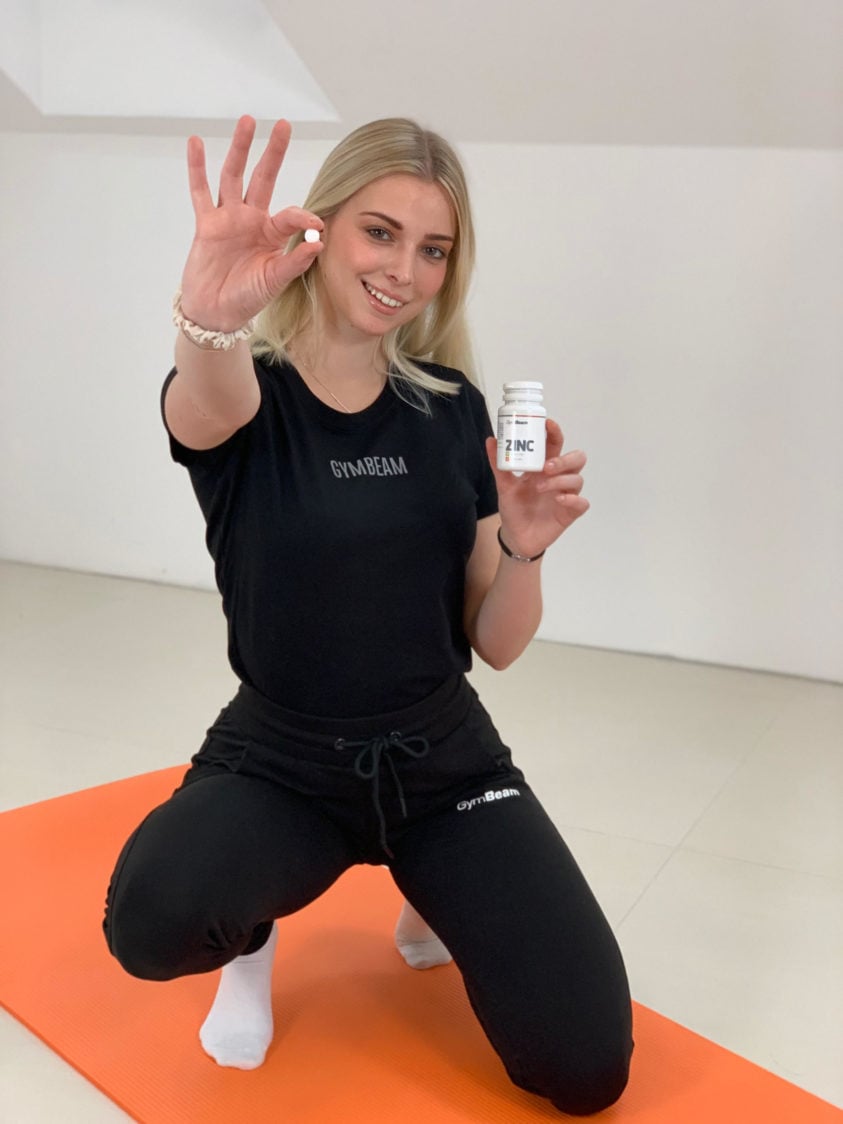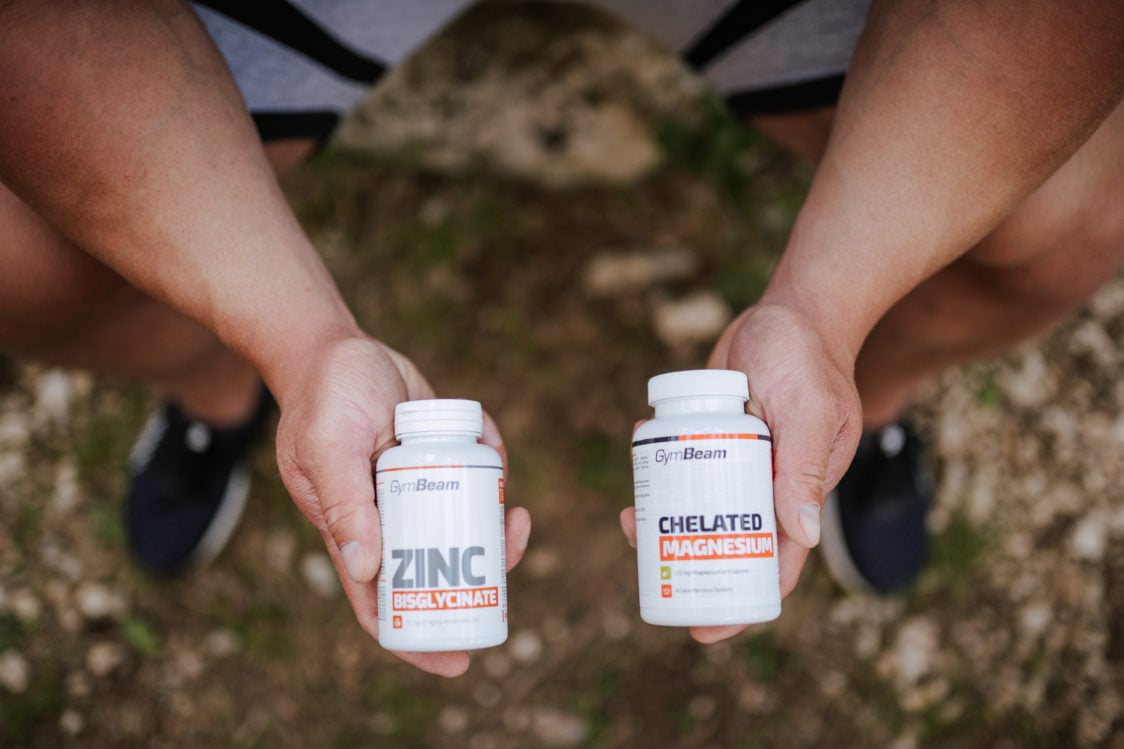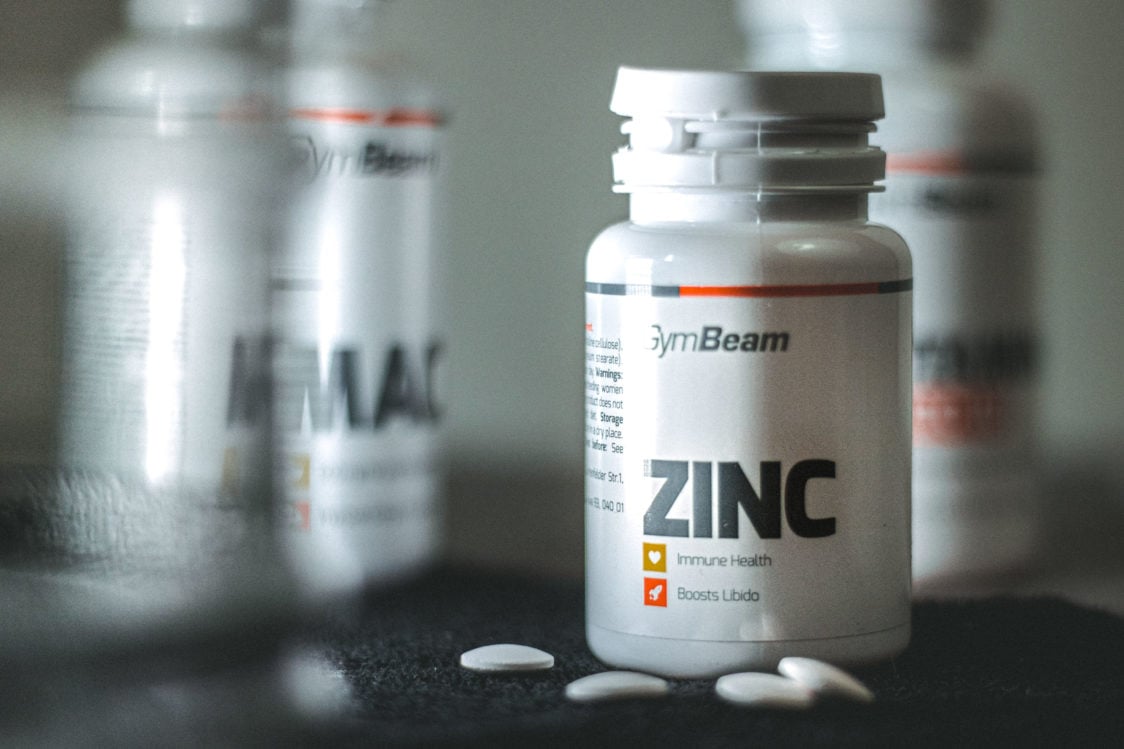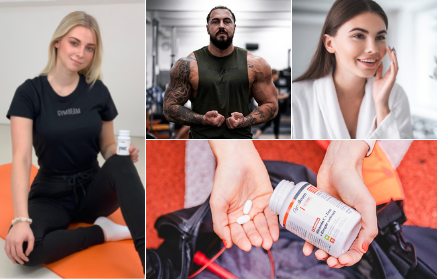Table of Contents
Zinc is a mineral involved in more than 300 enzymes in our body. It is crucial for their proper function, and it contributes to the proper metabolism of all major macronutrients. But its role in the body is far from over. Without sufficient zinc intake, our immune system would not function properly either.
Moreover, it helps maintain optimal testosterone levels and contributes to normal fertility. It is also indispensable for healthy hair, skin, and nails. All of this, in short, makes zinc one of the most important micronutrients in human nutrition. However, there are many more reasons to make sure you get enough of this substance. In today’s article, you will learn about the best sources of zinc and its supplements.
What is zinc, and what is its function in the body?
Zinc is an essential mineral that our body cannot produce on its own, and for this reason people need to ingest it regularly, either in the form of a varied and balanced diet or through supplements. You may be surprised at how many key processes in the body would not occur without zinc. [1]
Why is zinc so important?
- More than 300 enzymatic reactions in the body depend on it, such as those involved in digestion (metabolism of carbohydrates, fats, proteins, and vitamins) or nerve functions that are important for the proper functioning of the whole body.
- It is required for the synthesis of DNA, which carries genetic information and is contained in almost every human cell. It plays such a vital role in the development of the baby during pregnancy and also during adolescence.
- Crucial for the division and formation of new cells, which then form tissues and organs in the body.
- Plays an important role in immune functions that protect the body from disease.
- Helps to protect cells from oxidative stress by increasing the activity of the antioxidant glutathione, which is naturally found in the body. In addition, it itself reduces the negative effect of NADPH oxidase, which is one of the free radicals that cause oxidative stress.
- Involved in the formation of proteins and also in the growth and regeneration of muscle mass.
- Supports the wound healing process and helps maintain healthy skin. [1-4]

Zinc deficiency
Low zinc intake is often found in developing countries, but it is not exceptional even in the case of the population of developed countries. It is estimated that more than 17% of the world’s population is at risk from a zinc deficit. According to the World Health Organization (WHO), one third of people worldwide are at risk of deficiency of this mineral. A large part of this is due to its low dietary intake or poor absorption in the body. [4–6]
Who is most at risk of zinc deficiency?
- People with health problems. For example, wound healing and long-term skin conditions increase the body’s requirements for zinc intake. Also, people with diseases of the digestive tract (Crohn’s disease, ulcerative colitis), liver, kidney, or diabetes may have higher losses or impaired absorption of zinc.
- Vegetarians and vegans. Zinc from plant sources is typically less absorbable than that from animal sources (meat, fish, seafood).
- Pregnant and breastfeeding women. According to the European Food Safety Authority (EFSA), they have an increased daily zinc requirement of up to 39% due to foetal development or breast milk production (lactation). [25]
- People with a high alcohol intake. On average, 30-50% of people who drink alcohol excessively are zinc deficient. Alcohol both reduces its absorption in the intestines and increases its excretion by the kidneys.
- On a strict diet. It typically involves a reduction in energy intake, which entails eating less. In some cases, people also cut out entire food groups. The body may then lack important sources of nutrients, including zinc.

Signs of zinc deficiency
The best way to know if you are deficient in zinc, is to have your blood tested by your doctor. You may already have some symptoms that are often associated with a deficiency of this mineral. Let’s take a closer look.
- Decreased or increased appetite. This is mainly due to zinc’s ability to affect the amount of hormones in the body that regulate appetite. These include, for example, leptin and ghrelin.
- Frequent morbidity. Have you been sick more often than usual lately? If you’re constantly in a cycle of sniffles, colds, and other respiratory ailments, you may be lacking zinc. This is because it helps your body fight off different types of infections by supporting your immune system.
- Impaired memory and concentration. Zinc deficiency can have a negative effect on the formation of brain cells (neurons), typically leading to impaired memory, learning, and other brain functions.
- Deterioration of hair, nails, and skin. If you suffer from acne, hair loss or poor nail quality, you should pay attention. Zinc is crucial for the health of your skin, hair, and nails.
- Poor eyesight. Have you been seeing the world in a blurry manner lately? Maybe you don’t need new glasses, but just to replenish zinc. It is part of the eye tissue and at the same time it is important for the metabolism of vitamin A, which contributes to healthy vision.
- Impaired sexual health. Adequate zinc intake is also essential for normal fertility and libido. It also contributes to the production and maintenance of the levels of the male sex hormone testosterone. Thus, its deficiency can lead to disorders in this area as well.
- Reduced performance and lack of energy. Zinc plays a vital role in the metabolism of macronutrients, from which the body then obtains energy and other substances for its proper function in daily activities. [7-10]
You might be interested in these products:
What effects does zinc have, and what is it actually good for?
There are a number of reasons to ensure an adequate zinc intake. This nutrient is involved in the optimal functioning of the whole body and it is good to know why you should pay attention to it. In some areas regarding body function, it is actually essential. What does zinc support?
1. Zinc is important for proper immune function
Zinc plays an important role in the development of the immune system and continues to be important for its proper function. According to a number of studies, its supplementation can reduce the risk of certain diseases. It promotes the activity of white blood cells, which have the ability to fight viruses and bacteria. At the same time, it helps macrophages (immune cells) perform their function in absorbing unknown and potentially dangerous particles in the body. [1]
You should also make sure you get enough zinc if you often catch colds. According to studies, supplementation with this substance can reduce the duration and severity of symptoms of respiratory diseases such as a cold or cough. [4]
If you are wondering which other substances could help you with respiratory illnesses, read our article Which Nutritional Supplements Can Help with Flu and Colds?

2. Zinc has a positive effect on the health of hair and nails
With an adequate intake of zinc, you will promote hair growth from the roots. This mineral promotes the proper function and renewal of the hair follicles from which hair grows. In fact, the positive effect of zinc on hair growth has also been confirmed in studies in which it was used by patients with alopecia (excessive hair loss). These people are often deficient in zinc, and an increased intake of this substance has in many cases helped to restore hair growth. [11]
Zinc is also crucial for the strength and overall health of the nails. This is mainly due to its positive effect on the growth of the cells from which nails are formed. It helps to keep them strong and free from brittleness. [12]
Zinc is not only important for healthy hair. If you are wondering which other dietary supplements are most helpful in hair care, read our article How to Improve Hair Quality and Which Vitamins Are Best for Hair?
3. Zinc is crucial for healthy skin
Zinc is also crucial for maintaining healthy skin. It contributes to skin integrity, regeneration, and the formation of new skin cells. In addition, it promotes the transport of vitamin A from the liver to the skin, which helps to maintain its optimal hydration and healthy appearance. In addition, the beneficial effects of zinc are also used in cosmetic products, such as creams for sensitive and irritated skin. [13]
When investigating the action of zinc in the body, it has also been found to promote the formation of keratin and collagen. These are the main proteins found in the skin. They are also indispensable for the skin’s elasticity (flexibility), firmness and resistance to external influences. Thanks to its antioxidant properties, zinc also helps to protect the skin from the negative effects of UV rays that penetrate the skin from the sun. [14]
If you’re wondering what other nutrients can help maintain healthy skin when you tan, check out our article The Best Foods and Nutrients for a Bronze Tan and Youthful Skin.
4. Zinc supports the production and maintenance of testosterone levels
The amount of zinc in the body is also related to the level of the hormone testosterone. It has an effect on the conversion of cholesterol and other substances from which testosterone is formed in the body. Optimal levels of this hormone are important for male sexual health, fertility, libido, and sperm production. It also plays a role in muscle size and strength.
Testosterone is not just the prerogative of men. Quite naturally, women also have it in the body to a much lesser extent. In their case, it affects the maintenance of strong bones, the function of the ovaries and, as in the case of their male counterparts, influences sexual libido. Thus, sufficient zinc intake should not be underestimated by women or men. [15-16]
If you are wondering what problems testosterone deficiency can cause in the body, read our article 10 Signs of Testosterone Deficiency – What Causes It and How to Solve It?

5. Zinc helps relieve menstrual symptoms
If you are one of the women who struggle with severe PMS (Premenstrual Syndrome) symptoms every month, such as mood swings or headaches, try focusing on your zinc intake. Zinc has an effect on the levels of the hormone progesterone, fluctuations in which can cause these symptoms. It can also help to relieve symptoms in women who suffer from dysmenorrhoea (painful periods).
In one study, some participants with dysmenorrhea took 50 mg of zinc two times a day for four days before the start of menstruation. Compared to women without zinc supplementation, they reported lighter menstrual symptoms and less bleeding. They did not have as many headaches, did not feel as tired, and managed daily activities a little more easily. These are the reasons why zinc is a popular component of complex dietary supplements to help maintain female hormonal balance. [13, 17]
6. Zinc promotes eye health
Zinc is the most widespread mineral in the retina. It is no wonder that it has a significant effect on the health of the eye. It is part of the eye pigment (colour) and also plays a role in the restoration of rhodopsin. This visual pigment is sensitive to light and stands at the very beginning of the processes thanks to which we are able to see. In addition, zinc supports the metabolism of vitamin A, from which rhodopsin is formed. Its supplementation is recommended for people who want to protect their eyes from a disease associated with ageing – macular degeneration. It’s not so surprising that zinc is commonly added to supplements to support vision. [18]
You can also boost your vitamin A intake with beta-carotene. If you are interested in the other benefits of this well-known antioxidant, read our article Beta-Carotene – A Plant Source of Vitamin A for Your Eyes and Skin.

7. Zinc is also important for memory and other brain functions
Zinc also plays a role in the proper functioning of the brain. In fact, it is found in high concentrations in a part of the brain called the hippocampus. This influences the psyche and is also important for information storage and long-term memory. Studies have also found that zinc has an effect on Brain Derived Neurotrophic Factor (BDFN). This is a key molecule that is related to learning and memory. Adequate intake of this substance will support significant brain functions that are crucial, for example, when studying for exams, performing work duties, but also in everyday life. [15]
Wondering what else besides zinc can help you with concentration and other brain functions? Find out in our article How to Improve and Maintain Concentration at Work and During Study?
8. Zinc promotes wound healing
Zinc plays an important role in the proper healing of wounds, such as those caused by burns or other skin damage. It is involved in the formation and division of new cells and also helps protect the body from infection. In addition, it contributes to the formation of connective tissues such as collagen. This is then critical for elasticity and maintaining the overall health of the skin. In addition, it supports the proper function of the joints. [16]
How to supplement zinc?
You may have thought, when reading all these benefits, that you are not sure what zinc is actually contained in. Of the foods, oysters are the richest source. Don’t worry, if you’re not a seafood lover, you can also get zinc from regular foods such as beef or beans. In addition, you can find it in many nutritional supplements. These will simply help you reach the recommended daily dose of zinc.
1. Zinc in foods
What foods should be included in the diet for an adequate zinc intake? [20]
Product | Amount of zinc per 100g |
|---|---|
| Oysters | 39.3mg |
| Pumpkin seeds | 7.81mg |
| Cashew nuts and cashew butter | 5.6mg |
| Oats | 3.64mg |
| Beef | 3.62mg |
| Beans | 3.37mg |
| Almonds and almond butter | 3.31mg |
| Chicken meat | 1.47mg |
| Eggs | 1.24mg |
What affects the absorption of zinc from food?
If you prefer a plant-based diet, you should pay even more attention to your zinc intake. This is because zinc is typically less easily absorbed in plant-based foods. This is mainly due to the phytate content, which is a natural component of plants and plays a storage role (source of phosphorus). However, they can also bind to zinc, which subsequently prevents its proper absorption. This can then reduce it by 5-15%.
However, some kitchen methods can reduce the amount of phytate and their negative effect on the absorption of minerals in food. According to studies and established practice of lovers of plant food, soaking or germinating seeds and nuts works. Fermentation has also proven itself in this regard, according to experts. For example, you can try fermented oats for breakfast. [21]
2. Zinc in dietary supplements
Zinc can be found in a wide range of dietary supplements, either on its own or as part of a comprehensive supplement to support overall health. It is also added to functional and BCAA drinks. When choosing supplements, however, it is important to pay attention to the form in which zinc is found in them. This is because it affects the absorption of this mineral into the body. [22–24]
- Better absorbed forms of zinc: chelate (bound as zinc bisglycinate), citrate, gluconate, orotate, acetate and liposomal zinc
- Less absorbable forms of zinc: oxide and sulphate

How to take zinc?
The chelate bond is currently considered the most absorbable form of zinc after its liposomal form. In the chelate bond it is bound to other substances (amino acids). In this complex, it is more available to the body and also increases the protection of zinc from the negative influence of some substances that reduce its absorption, such as the aforementioned phytates [23, 30]
When to take zinc?
- Zinc is one of the essential minerals, so our body cannot create it on its own. Therefore, it is completely dependent on our intake from diet and supplements. Ideally, include foods rich in zinc regularly in your diet. Alternatively, you can support your intake with supplements.
- In the case of nutritional supplements, it is recommended to take them between meals. You thus avoid interactions with other nutrients from food that could reduce its absorption (this is not the case with the chelated zinc). However, if you feel that zinc is causing you problems on an empty stomach, take this mineral with food instead. [25]
- Zinc supplements are also not recommended to be taken at the same time as those containing calcium and iron (does not apply to chelated zinc), as these minerals could also reduce zinc absorption. [24]
What is the recommended daily dose of zinc?
- The European Food Safety Authority (EFSA) recommends a daily intake of 9.4-16.3 mg for adult men and 7.5-12.7 mg for women, with the higher dose appropriate for those with higher phytate intakes. During pregnancy and lactation, women should further increase this amount by 1.6-2.9 mg per day. [26]
- The Nutrition Society of German-speaking Countries (DACH) recommends a dose of 11-16 mg per day for men and 7-10 mg per day for women. This amount also takes into account phytate intake. Pregnant and breastfeeding women should increase their daily zinc intake to 14 mg per day. [27]
- People with low zinc absorption, digestive problems or healing wounds should have a higher zinc intake.
- For athletes, a higher zinc intake could help maintain immune function during demanding training sessions. In studies, a dose of 25 mg of zinc daily had a positive effect in this regard. [28]

What can happen after a zinc overdose?
Not only a deficiency, but also a long-term excessive intake of zinc can cause a number of problems. These include loss of appetite, nausea, vomiting, and other digestive difficulties. Then there are abdominal pains or headaches. Doses as high as 150-450 mg of zinc have also been associated with a reduction in copper absorption in the body, which can then result in anaemia from a copper deficiency. Such high levels of zinc can also have a negative effect on iron function in the body as well as on immunity. For this reason, it is better to follow the above recommended doses. If you ingest zinc from food and do not overdo it with supplementation, you do not have to worry about a zinc overdose. [4]
So what is zinc for? Final summary
- Helps to maintain the normal condition of bones, hair, nails, and skin.
- Contributes to the normal metabolism of fatty acids, carbohydrates and other macronutrients.
- Supports normal cognitive functions such as memory, concentration, or attention.
- Plays a role in normal DNA synthesis to ensure proper development of the body.
- Helps maintain normal levels of testosterone in the blood.
- Promotes fertility and reproduction.
- Participates in protein synthesis.
- Contributes to the maintenance of healthy eyesight.
- Supports immune function.
- Protects cells from oxidative stress.
- Involved in the process of cell division.
- Helps maintain the acid-base balance of the body. [29]
What should you remember?
After reading today’s article, you already know that you should definitely not underestimate your zinc intake. It can help you improve the quality of your hair, skin, and nails. You’ll also appreciate it when you need to study for an exam or concentrate as much as possible at work. It will also help with maintaining testosterone levels, which for example, is key for muscle growth. Likewise, it can support women’s hormonal health and relieve some menstrual symptoms. So with an adequate intake, you may see improvements in many areas of your life.
If you liked this article and took away useful information, please share it with your friends. This will also help them learn why zinc is so important for our health.
[1] King, J. C., Brown, K. H., Gibson, R. S., Krebs, N. F., Lowe, N. M., Siekmann, J. H., & Raiten, D. J. Biomarkers of Nutrition for Development (BOND)—Zinc Review. – https://doi.org/10.3945/jn.115.220079
[2] Jarosz, M., Olbert, M., Wyszogrodzka, G., Młyniec, K., & Librowski, T. Antioxidant and anti-inflammatory effects of zinc. – https://doi.org/10.1007/s10787-017-0309-4
[3] Hernández-Camacho, J. D., Vicente-García, C., Parsons, D. S., & Navas-Enamorado, I. Zinc at the crossroads of exercise and proteostasis. – https://doi.org/10.1016/j.redox.2020.101529
[4] Office of Dietary Supplements—Zinc. – https://ods.od.nih.gov/factsheets/Zinc-HealthProfessional/
[5] NCBI Bookshelf. Zinc Deficiency. – https://www.ncbi.nlm.nih.gov/books/NBK493231/
[6] Maares, M., & Haase, H. A Guide to Human Zinc Absorption: General Overview and Recent Advances of In Vitro Intestinal Models. – https://doi.org/10.3390/nu12030762
[7] Australia, H. Zinc deficiency . – https://www.healthdirect.gov.au/zinc-deficiency
[8] Baltaci, A. K., & Mogulkoc, R. Leptin and zinc relation: In regulation of food intake and immunity. – https://doi.org/10.4103/2230-8210.105579
[9] Szewczyk, B. Zinc homeostasis and neurodegenerative disorders. – https://www.frontiersin.org/article/10.3389/fnagi.2013.00033
[10] P, C., Sk, K., S, Y., R, S., Sc, L., Sr, S., Ek, P., & Kp, W. Zinc supplementation might potentiate the effect of vitamin A in restoring night vision in pregnant Nepalese women. – https://doi.org/10.1093/ajcn/73.6.1045
[11] Park, H., Kim, C. W., Kim, S. S., & Park, C. W. The Therapeutic Effect and the Changed Serum Zinc Level after Zinc Supplementation in Alopecia Areata Patients Who Had a Low Serum Zinc Level. – https://doi.org/10.5021/ad.2009.21.2.142
[12] Zinc deficiency and nails: Relationship, signs, treatment, and more. – https://www.medicalnewstoday.com/articles/zinc-deficiency-and-nails
[13] Bhowmik, D., Bhattacharjee, C., & Kumar, S. A potential medicinal importance of zinc in human health and chronic disease. – http://bergenhelse.no/wp-content/uploads/2019/06/A-potential-medicinal-importance-of-zinc-in-human-health-and-chronic-disease.pdf
[14] Gupta, M., Mahajan, V. K., Mehta, K. S., & Chauhan, P. S. Zinc Therapy in Dermatology: A Review. – https://doi.org/10.1155/2014/709152
[15] Frank, K., Patel, K., Lopez, G., & Willis, B. Zinc Research Analysis. – https://examine.com/supplements/zinc/research/
[16] Does Zinc Supplementation Accelerate Wound Healing? – https://www.woundsource.com/blog/does-zinc-supplementation-accelerate-wound-healing
[17] Harvard Health. Testosterone—What It Does And Doesn’t Do. https://www.health.harvard.edu/drugs-and-medications/testosterone--what-it-does-and-doesnt-do
[18] Sangestani, G., Khatiban, M., Marci, R., & Piva, I. The Positive Effects of Zinc Supplements on the Improvement of Primary Dysmenorrhea and Premenstrual Symptoms: A Double-blind, Randomized, Controlled Trial. – https://doi.org/10.22038/jmrh.2015.4463
[19] Ugarte, M., & Osborne, N. N. Recent advances in the understanding of the role of zinc in ocular tissues. – https://doi.org/10.1039/c3mt00291h
[20] FoodData Central. – https://fdc.nal.usda.gov/index.html
[21] Gupta, R. K., Gangoliya, S. S., & Singh, N. K. Reduction of phytic acid and enhancement of bioavailable micronutrients in food grains. – https://doi.org/10.1007/s13197-013-0978-y
[22] LIVESTRONG.COM. Which Form of Zinc Is Best? – https://www.livestrong.com/article/409076-which-form-of-zinc-is-best/
[23] Udechukwu, M. C., Collins, S. A., & Udenigwe, C. C. Prospects of enhancing dietary zinc bioavailability with food-derived zinc-chelating peptides. – https://doi.org/10.1039/c6fo00706f
[24] Mount Sinai Health System. Zinc Information. – https://www.mountsinai.org/health-library/supplement/zinc
[25] Mayo Clinic. Zinc Supplement (Oral Route, Parenteral Route) Precautions. – https://www.mayoclinic.org/drugs-supplements/zinc-supplement-oral-route-parenteral-route/precautions/drg-20070269
[26] EFSA. Scientific Opinion on Dietary Reference Values for zinc. – https://www.efsa.europa.eu/en/efsajournal/pub/3844
[27] DACH-Referenzwerte. – https://sge-ssn.christian.beta.cubetech.ch/grundlagen/lebensmittel-und-naehrstoffe/naehrstoffempfehlungen/dachreferenzwerte/
[28] ISSN exercise & sports nutrition review update: Research & recommendations. – https://jissn.biomedcentral.com/articles/10.1186/s12970-018-0242-y
[29] EFSA Panel on Dietetic Products, Nutrition and Allergies (NDA). Scientific Opinion on the substantiation of health claims related to zinc. – https://doi.org/10.2903/j.efsa.2010.1819
[30] Magnesium Bisglycinate as safe form for mineral supplementation in human nutrition. – https://www.semanticscholar.org/paper/Magnesium-Bisglycinate-as-safe-form-for-mineral-in-Siebrecht/df3ec33570bc26330097284c53a4a5c3815be905


Add a comment